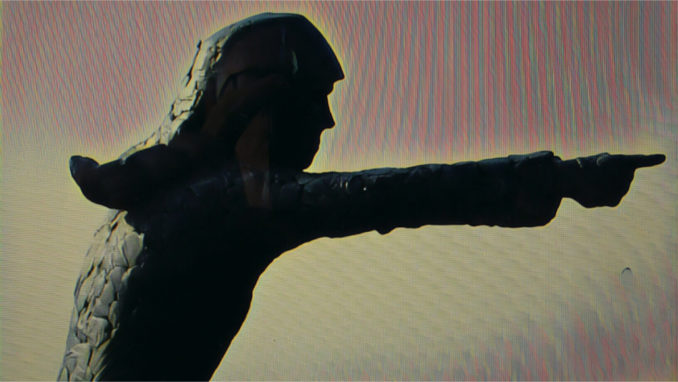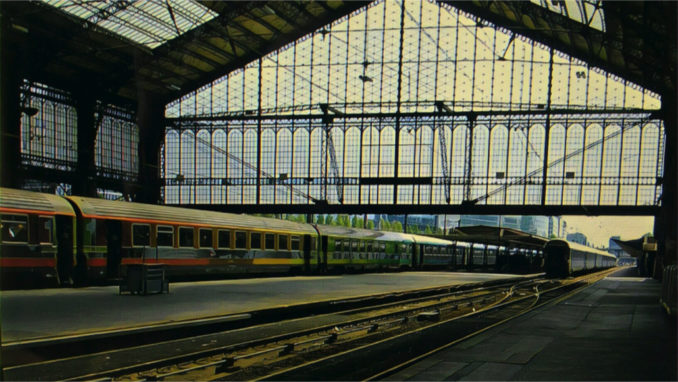
Stryper wyfke, spots the English fleet, Boboko skylge – Licence CC BY-SA 2.5
We are in the front room at 28 Dumfries Street, Kovan. The awful Nicolaas and Dora Clogg have called in response to an “Operation Bonfire” appeal in the Straights Star. Tai Tai and Lotus are upstairs fussing over their accessories for the fast approaching Embassy bash.
Mr Clogg begins to tell me about Operation Bonfire while sipping one of Rose our maid’s mango juice, ice, lemon and straw specialities. Had I been a Dutch schoolboy, raised in their colonies while my parents farmed a rubber plantation (with grateful native labour), before being packed off to an English public school, then I would have already known all about it.
“Perfidious Albion,” Dora Clogg reminded me.
I went glassy-eyed and stifled a yawn. This was a waste of time. How could I get rid of them? Be unbearably rude? Tempting. Dora nodded at the telling of every underhand tactic.
It concerned Robert Holmes, who to be blunt, I’d never heard of. The year was 1666 which, likewise, I thought contained no more than a Great Plague quenching fire. However, events therein had seared themselves onto the Dutch psyche and that of their Habsburg allies in Spain.
Holmes had noted the Royal Navy’s standing order to be aggressive and to take the fight to the enemy. He had crept up on the Dutch at Harlingen.
“Which these days lies inland,” Dora noted, serious-faced, as if silting up was the fault of the English too.
Holmes had employed a treacherous Dutch captain to guide him through the shoals. More bad form, if you’re on the losing team.
Johnny foreigner’s assumption that we should always lie down and let him walk all over us was, yet again, mistaken. Holmes had an eye on the Dutch East Indies fleet, laden with goodies, which the Dutch had liberated from the natives in their colonies.
Holmes proceeded to give that Dutch fleet an excellent torching, taking good advantage of fire ships and the prevailing winds. He even managed to squeeze in a tiny bit of light pilfering. Well done that man.
One was reminded of more recent good shooting navy days, this time at the expense of the French, at places like Toulon and Mers-El-Kabir. My father’s cousin was killed in Algeria, doing what the useless French should have been doing. One has zero sympathy for them.
None of this has anything to do with the missing Mr Stein. Hold on a moment, two world’s were about to collide. Clogg mentioned his odious superior, Sir Julian Minsk, I tried not to fall off my chair.
“Mentioned it in his sleep, on more than one occasion,” said Mr Clogg.
“Mutters about Operation Bonfire between snores,” Dora added, not in bed but, “On the long flights to Brussels,” she assured me, stifling any indiscretion perhaps being revealed. Sir Julian did have a bit of a reputation.
Mr and Mrs Clogg played the old one-two. Nice Clogg, nasty Clogg.
“Something seems to be up.”
“And the English are behind it, aren’t they Nicolaas?”
“All this data going missing.”
“Your Operation Bonfire, Mr Worth, and Sir Minsk’s Operation Bonfire, simultaneous.”
“Perhaps for the common good, you could share what you already know, Mr Worth?”
It was a nice thing to say. It was Dora’s turn next, she turned very nasty indeed.
Thus far I had avoided doing a full check on our missing landlord and nuclear scientist, Mr Stein. It would have meant informing the Singapore Consultancy, the Embassy, London and all points in between. It would have cost a fortune, taken forever and everybody from the Queen to the tea lady would have been grumpy with me if it had turned out to be a wild goose chase.
Instead, carpets had been valued, Tai Tai had been sent chasing after redirected phones and journalists had been asked to kindly keep an eye open. Meanwhile, the Spanish Secret Service, no doubt wary of their own data disappearing, via their presence in Singapore (the not very well disguised a lawyer at a bank, Mrs Dora Clogg), had run a full check on me. Flattering. I hoped they didn’t send me the bill.
Mrs Clogg enjoyed the big reveal. She had my full name, title and a significant piece of evidence. Thankfully Lotus and Tai Tai were still upstairs, well out of earshot, fussing over their appearances. Rose was in her maid’s room reading her business books. Dora was able to combine the revelation with another of her and her husband’s obsessions, ‘the Europe’. She raised her voice, perhaps as the Dutch East Indies company might have when cross about the loss of their goodies up a mudflat in Hooligan (or wherever).
“Before my country had the good fortune to join the Europe, only a short time after the death of the Generalissimo, a traveller presented his passport at the frontier to the Kingdom of Spain.”
I kept a straight face, the type Holmes might have kept next time he’d expected to be allowed to squeezed his angry Dutch emigre mistress in a room above a tavern in Holborn.
“Electronic records of this were the first to vanish in the present difficulties,” she continued.
She twisted her face as if a demented flamenco dancer betrayed.
“That traveller was a certain, Doctori Ashley de Pfeffel Worth-Saying.”
I hesitated to contradict her. Instead, I defended myself by noting a fatal inconstancy in her argument.
“If the data has disappeared, Mrs Clogg, then how can you know any of this, let alone be certain of it?”
She reached into her pocket.
“Because this survives.”
She handed me an old photograph.
It was a much younger me. Sat in the corner seat of a railway compartment, looking somewhat refreshed, drinking wine straight out a bottle. My bare feet were propped up against a companion opposite, concealed by Mrs Dora Clogg’s grasping thumb. The other passengers, judging by their uniforms, appeared to be Spanish army conscripts.
“Churchill has his feet massaged by Roosevelt, no lo es?”, Mrs Clogg declared with a flourish.
***
Firstly, I must explain the “Doctori”. If, when you’re taken ill and shouting for a doctor, I appear, then keep on shouting. My first degree was a third which means that my second degree had to be another first degree, which was a first. I didn’t do a second degree (which would have been my third), as I already had a first via my second. Got that? In some territories, if you have the top class of degree, you can call yourself “Doctor”. A kindness bestowed upon me, with a bit too much fake enthusiasm, by Mrs Clogg.

Gare d’Austerlitz, Paris, vue des voies. , Boboko skylge – Licence CC BY-SA 2.5
Secondly, recalled from close to the start of my career, in light of the Clogg revelation, I must recount the following.
It is a long time ago, many decades, the early nineteen eighties. The world and all of us are different. Allow me to remember myself, barely no longer a boy, looking even younger than those few years, with a full head of hair, a full set of teeth and twenty-twenty vision. In one’s early twenties one is rather slightly built, myself even athletic and willowy.
I was in Paris, in a delicatessen, in anticipation of a summer evening’s long journey. Shelved to the ceiling with all kinds of exotica unknown to an English palette, a ladder was required to reach the outrageously expensive pots whose labels I didn’t understand. In my dreadful French, I bought an excellent pâté by accident, from a North African Parisian whose French seemed little better than mine.
As was to become my want, I was creeping up on an unsuspecting part of the world with a little job to do. A change of casual clothes, some toiletries and one or two disguised and concealed bits and pieces were in my light blue air force backpack. I possessed little else. For reasons that will become obvious, I needed a companion. Need I say, that this had been arranged for me and that I assumed that I’d be in charge of them? And need I add that in the second part of this expectation, I was much mistaken?
The rendezvous involved finding Gare d’Austerliz by tea time, getting on L’Aquitaine, and somehow bumping into my contact.
At the time, the French railways assumed that all would be well with the world if a self-important Grande Provincial, and his femme and shackles, could leave their home town anywhere in France and arrive in Paris by 11 am. Having conducted a day’s business or pleasure, they must then leave the capital in the early evening and arrive back at their important, but unknown, dot on the map before midnight. Therefore, a tranche of expresses converged on Paris every morning and subsequently fanned out from the City of Light in the early evening.
One such was a crack express to the South West of France. It was called L’Aquitaine (after the region which it served) and at its peak ran non-stop for the 360 miles to Bordeaux. Fortunately, during our story, although no longer classified as a Trans Europe Express, and not first-class only, L’Aquitaine was still running, still crack, made one or two extra stops and usefully, on some days, continued to the border with Spain.
My instructions were to get to Paris and to get on it. If it was fully booked, get on it anyway. If they wouldn’t let me on, then think of something. Cling on to the outside, climb onto the roof. In reality, I arrived in sufficient time to be able to book a reservation and along with my pâté, after a short wait, find my carriage and make myself comfortable. Departure was at 17:45, prompt. At that time of the year, there was still plenty of daylight with which to enjoy passing through the great city’s environs.
While anticipating my rendezvous, I addressed my little pot from the deli. The French don’t notice when ten thousand German tanks are massed on their border but, from twenty miles, they can spot an Englishman eating an expensive pâté with a penknife, straight out of the bottle. An alarm must sound at the Ministry of Culture.
From my fellow passengers, there was much hissing, accompanied by shrugging and tut-tutting. I ignored them uncomfortably. One spoke to me in French. I ignored him with great pleasure. Les Francais muttered amongst themselves and then despatched someone to the restaurant car on my behalf. I was delivered of two slices of grainy bread, a plate and a broad-bladed knife. I pronounced “merci” as badly as I could, before spreading and eating my delicious pâté properly. I divided my interest between the window and my fellow passengers, one of whom was my contact, but who?
To be continued …….
The Goodnight Vienna Audio file
Audio Player



